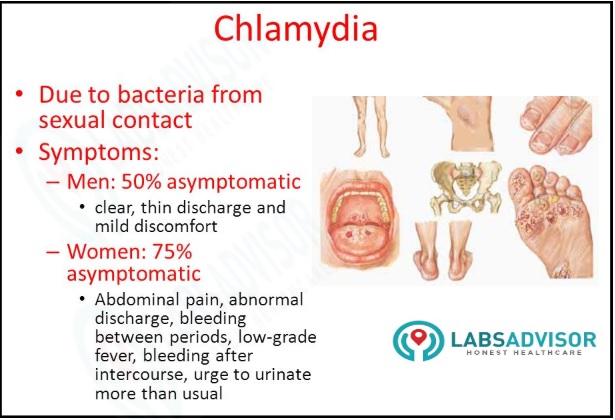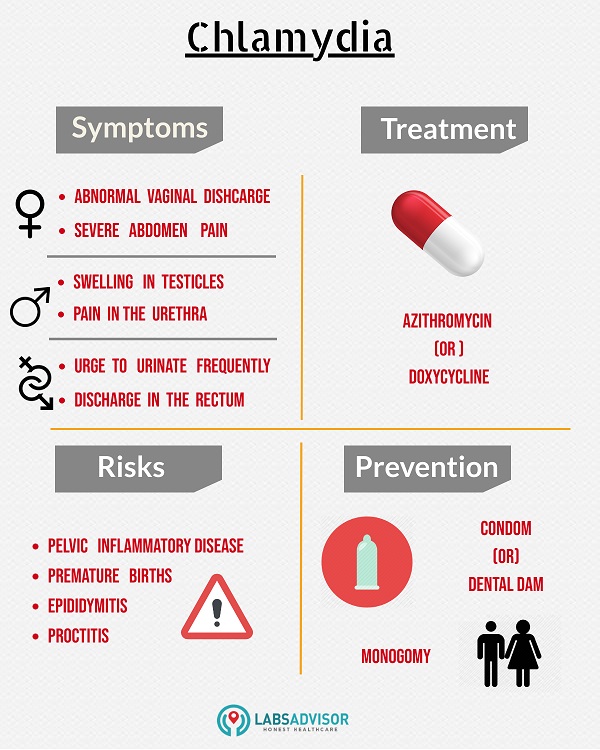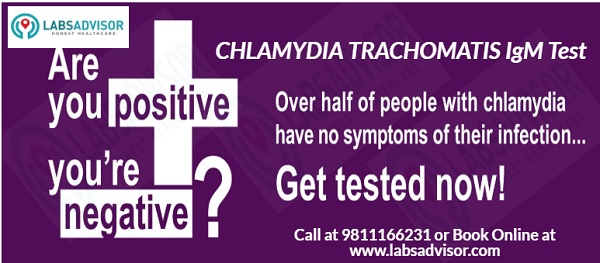
Chlamydia is a common type of sexually transmitted disease caused by the bacteria Chlamydia trachomatis. It can be spread through vaginal sex, anal sex, oral sex, or particularly unprotected sex.
Book this really important test at your local top quality labs through us at up to 50% discount. The lowest Chlamydia test cost in India is ₹1080 only.
Chlamydia Test in India Through LabsAdvisor
|
Book your Chlamydia test online to avail the exclusive offers and cashback!
Here are the simple steps to book your appointment at a discounted price.
- Click on the link given in the below table according to your preferred city.
- Choose the most suitable lab for your Chlamydia test.
- Select your preferred date and time for your appointment.
- Enter the patient details and click submit.
- Congratulations! You have booked an appointment at a discounted price.
Book online yourself at any time of the day or night by clicking on the appropriate link.
Chlamydia Test Cost in India and Lab Details
Below is the list of the Chlamydia test cost in India, please click on the link you want and you can see all the labs near you and book online.
| Chlamydia Test Labs & Book Appointment | Price Starting From |
| Chlamydia Test Price in Delhi | ₹1232 |
| Chlamydia Test Price in Gurgaon | ₹1232 |
| Chlamydia Test Price in Noida | ₹1232 |
| Chlamydia Test Price in Mumbai | ₹1080 |
| Chlamydia Test Price in Navi-Mumbai | ₹1080 |
| Chlamydia Test Price in Thane | ₹1080 |
| Chlamydia Test Price in Other Indian cities | ₹1080 |
Currently, we are unable to offer Chlamydia test in certain cities. Apologies!
What is chlamydia?
Chlamydia is a common type of sexually transmitted disease caused by the bacteria Chlamydia trachomatis. It can be spread through vaginal sex, anal sex, oral sex, or particularly unprotected sex.
Typically it can affect both men and women but women are generally more prone to Chlamydia infection. It affects their intimate reproductive organs including the rectum, cervix, or throat. In men, the bacteria affects the urethra (urinal passage inside the penis), rectum, and throat.
Chlamydia is surely treatable and does not spread through casual contacts like hugging, shaking hands, or kissing. But if left untreated it can lead to serious health issues. To detect the presence of the bacteria in your body, you must get tested for Chlamydia.
Click to read more about other sexually transmitted diseases and STD test cost in India.
How is chlamydia transmitted?
Anyone can get chlamydia infection by having oral, vaginal, or anal sex with someone who is already infected. The following people are most at a high risk of getting infected by chlamydia.
- Practicing unprotected sex
- Having multiple sex partners
- Having an STD infected partner
- Men having same-sex partners
- Using certain drugs
What are the symptoms of chlamydia infection?

People with chlamydia often experience no symptoms and if the symptoms do appear, they become noticeable only after 1-3 weeks of transmission of infections through sex.
symptoms in women
- Abnormal vaginal discharge
- Bleeding or clotting between periods
- Heavier flow and severe pain during periods
- Abdominal pain
- Low-grade fever
- Pain or bleeding after sexual intercourse
- Itching or burning during urination
- Urge to urinate more than usual
symptoms in men
- Clear, thin discharge and mild discomfort
- Pain during urination
- Unusual burning and itching at the tip of the penis
- Pain and swelling around the testicles
What are the risks of chlamydia infection?

As with most STIs, chlamydia also increases the risk of having HIV. Chlamydia can cause ectopic pregnancy in women (the pregnancy that occurs outside the uterus). A pregnant woman can also pass chlamydia to her fetus. If chlamydia is left untreated it can lead to other serious health issues. For example:
In women:
- Pelvic inflammatory disease (PID)-infection of the female reproductive system
- Cervicitis – severe inflammation of the cervix
- Salpingitis – inflammation of the fallopian tubes
- Bartholinitis – Cyst in the Bartholin’s glands (glands that are responsible to lubricate the vagina).
In men:
- Epididymitis – an abnormal curving at the back of the testicles
- Urethritis – inflammation of the urethra (the tube that passes urine)
- Reactive arthritis – Joint pain and swelling triggered by an infection in another part of the body.
What is the procedure of the chlamydia test?
There are no special preparations required for the chlamydia test. However, it is important to inform your doctor if you are taking any kind of medication. It is also advised not to apply any vaginal creams as it may affect the test results. Normally, Menstruation does not affect the test results. So you can also take the test during your menstrual cycle.
The chlamydia test is normally done on the urine samples of the patient. It is the most effective technique to detect the infection if any. You should not urinate at least 2 hours prior to the test. Only the initial urine stream should be collected in the tube. The sample will be then sent to the laboratory for further testing.
Sometimes a swab may be used to collect the samples, such as a vaginal swab, rectal swab, urethral swab, endocervical swab, etc.
Chlamydia tests can also be done on the blood samples. But is not widely used as the results may not show the presence of chlamydia at the time of the test.
How to prevent chlamydia infections?
The following are the few ways to prevent chlamydia infections.
- Have protected sex using condoms and avoid unnatural sex.
- Get yourself tested regularly if you are sexually active
- Get screened regularly if you have multiple sex partners

If you are a sexually active person, then it is strongly recommended to get tested for chlamydia at least once a year. You may also want to be aware of the other sexually transmitted diseases.
Interesting topics you may look for:







Frequently asked questions about the Chlamydia test
The following are the most common questions and their answers about the chlamydia test.